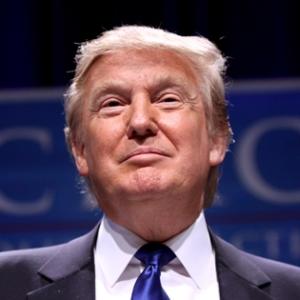This article was produced in collaboration with AlterNet and first appeared here.
Reeling from allegation after allegation of sexual misconduct, Republican presidential contender Donald Trump tried to go on the offensive on drug policy over the weekend, but in a manner typical of his campaign, he touched only briefly on the topic before flying off on new tangents, and he began his drug policy interlude with a bizarre attack on Hillary Clinton.

"Why don't we do that?" he demanded, adding that Clinton was likely "getting pumped up" as the prepared for that debate.
"We should take a drug test prior cause I don't know what's going on with her. But at the beginning of last debate, she was all pumped up at the beginning and at the end it was like, oh take me down. She could barely reach her car," he claimed.
The claim didn't come out of nowhere. Trump was echoing an ad from two weeks ago from the pro-Trump super PAC Make America Number 1 that showed Clinton coughing and then stumbling to her van on the morning of September 11. The super PAC is bankrolled by Trump backer and big time conservative donor Robert Mercer, who dropped $2 million on the PAC in July.
The unfounded allegation of Clinton pre-debate drug use and the demand for a drug test grabbed media attention, but if Trump was attempting to turn a corner and shift the campaign's focus away from his peccadillos, his strange accusation against Clinton only served to raise more questions about his temperament and suitability for the nation's highest office.

If anyone were paying attention to the policy details amidst all the racket about the drug test challenge, they would have heard drug policy proposals rooted squarely in the failed drug war strategies of the last century.
Trump would, he said, block drugs from coming into the US by -- you guessed it -- building the wall on the Mexican border. He would also seek to tighten restrictions on the prescribing of opioids. And he would reinstitute mandatory minimum sentences for drug offenders.
"We have 5 percent of the world's population but use 80 percent of the prescription opioids," Trump said, eerily echoing former rival Jeb Bush, who used the same language while campaigning in the state earlier this year.
That statistic is aimed at showing that the US is over-prescribing narcotic pain killers, but according to the World Health Organization, the actuality is that in much of the rest of the world, they are underprescribing them. In fact, the WHO said that in more than 150 countries with 83 percent of the global population, there is virtually no access to prescription opioids for relief of pain.
And the under-treatment of chronic pain isn't just a problem in India or China or Africa. According to the National Institute of Health, more than 50 million Americans suffer significant chronic or severe pain. An opioid policy that focuses only on reducing prescriptions without addressing the need for access to pain killing opioids for actual pain is only half a policy.
When it comes to the border, Trump correctly asserts that Mexico is the source of most of the heroin in the US (it produces 45% itself and another 51% comes from Latin America, mostly Colombia and Guatemala, often through Mexico), but relies on a hyper-interdiction policy ("build the wall") to thwart it. Interdiction -- blocking the flow of drugs into the country -- has been a pillar of US drug policy for decades, but despite massive border build ups and the doubling of the number of Customs and Border Patrol agents in the past 15 years, the drugs still flow.

The third component of his drug policy is a Reaganesque "lock 'em up." In his New Hampshire speech, he saluted running mate Mike Pence for increasing mandatory minimums for drug offenders as governor of Indiana.
"We must make similar efforts a priority for the nation," Trump said.
That position flies in the face of a growing bipartisan consensus that the use of mandatory minimums for drug offenses is draconian, ineffective, and harms mainly minority populations. During the Obama administration, mandatory minimum sentences have been reduced with congressional assent, and Obama himself has granted commutations to hundreds of drug war prisoners serving those draconian sentences, with little dissent.
Trump's drug policy is but a sketch, but even its vague outlines reflect outdated approaches to the issue and a quickness to resort to cheap demagoguery on the issue. Still, while there is plenty of room for discussion of his approach, Trump has apparently already left the issue behind, barely mentioning it since Saturday as he tilts at other windmills.
(This article was prepared by StoptheDrugWar.org's lobbying arm, the Drug Reform Coordination Network, which also pays the cost of maintaining this web site. DRCNet Foundation takes no positions on candidates for public office, in compliance with section 501(c)(3) of the Internal Revenue Code, and does not pay for reporting that could be interpreted or misinterpreted as doing so.)
This work by StoptheDrugWar.org is licensed under Creative Commons Attribution-ShareAlike 4.0 International
Comments
If Trump wins it wouldn't
If Trump wins it wouldn't surprise me if he took a page out of Duterte's drug war playbook; and really, Duterte's approach is simply a more public, shameless (and because of that, brutally honest), not-that-far of an extension of the excesses of the USA's drug policies. There are many authoritarians out there who see everything as a nail and want to bring the hammer down, damn any facts or compassion.
40 Years as of June 2016 of this Failed Drug War is Enough!
As Americans we need to treat drug addiction as a health issue. The policy of lock them up and throw away the key is not solving any of the addiction problems and it is just wasting money that could be spent on more worthwhile needs.
For a constant update on the money spent on this failed policy and other statistics please visit:
http://www.drugsense.org/cms/wodclock
I'm not a Trump fan but this
I'm not a Trump fan but this article horribly biased. I was actually impressed that he suggested more of a harm reduction approach. No one else has even mentioned the restrictions on drugs that could treat addiction. This is the same guy who has suggested legalizing all drugs in the past, suffice it to say it's clear he's open to different approaches. We can only speculate what he'd actually do if he got in office. I can't imagine him not supporting legalization of marijuana given it's current level of support and the economic benefits of doing so. I get the sense he's more worried about the massive amount of money that leaves the country from the drug trade than anything else.
In reply to I'm not a Trump fan but this by Kizzle (not verified)
Hi Kizzle! I noticed that
Hi Kizzle! I noticed that too. The article is very biased. When you actually listen to what Trump says he is more of a moderate republican and not the monster the lame stream media makes him out to be. Don't get me wrong. In the past I have come from a left of center, progressive, perspective. But I have to admit, liberal America has made so many bad judgment calls this election that I am very embarrassed for them and I now call myself Independent instead of liberal or progressive. The lame stream media has it out for Trump and that is because is an outsider to the globalist, corporate, control club that has dominated our government for the past several decades.He has this radical notion that the economy should be run for the American people instead of soulless international corporations. So they give the orders to the corporate controlled lame stream media to smear him in anyway possible. It is downright scary how badly liberal, progressive, America has let itself be manipulated by the corporate media. And while we are on the subject it is down right scary how authoritarian so called liberals and so called progressives have gotten over the past ten years as well.
In reply to Hi Kizzle! I noticed that by Alex (not verified)
The problem with Trump is more his character than policies
The biggest concern with his drug policies is that he'll be drawing his advisors from the Republican Party, which is still dedicating to holding up progress on drug war issues, and in particular his advisors Krispy Kreme, Giuliani and Gingrich are all implacable on drug war issues. Drug policy is not an important issue to him and he may outsource it to diehard alcohol supremacists.
In reply to The problem with Trump is more his character than policies by saynotohypocrisy (not verified)
Hi Saynotohypocrisy! You are
Hi Saynotohypocrisy! You are absolutely right in your concerns about the toxic influence of the republican party, or of the "alcohol supremacists" as you framed it. Trumps selection of VP was troubling in that regard as it showed him making concessions to the very corporate neo-cons who are responsible, behind the curtains, for the intense attacks against him coming from the lame stream media. It could be that he had to cut a unwanted deal of compromise behind the scenes in order to save his hide. Shillery is just as bad. On the other hand this new Alt-right movement that is a main factor in driving Trumps success among the young conservatives, seem like they are just as tired of the drug war as the progressives, and they are slowly taking over the republican party. So the forecast for the long run looks good for the republican party to change to a less puritanical mess over the course of a decade or so. It is the short run we have to worry about.
In reply to Hi Kizzle! I noticed that by Alex (not verified)
"No" to Trump and Mandatory Minimums for Drug Crimes
Nuff said.
In reply to I'm not a Trump fan but this by Kizzle (not verified)
Kizzle, and others, thanks
Kizzle, and others, thanks for coming to our site and joining the discussion. Phil did actually report on Trump's pro-legalization comments in a past article, and I think he wrote about Trump's proposals for dealing with heroin, which were not all bad. I realize that a reader seeing only this article won't necessarily find those other ones.
As an active participant in the criminal justice reform community here inside the Beltway, I can attest that there has been a real concern that Trump's "law and order" campaign theme could set back sentencing reform efforts, which have become bipartisan in recent years, amazingly more so than for the vast majority of issues. Some believe that Trump's rhetoric is a contribution factor to the likely failure of sentencing reform efforts in Congress this year. As some have pointed out, having people like Giuliani and Christie so prominent on his team is not a good sign either.
Clinton by contrast has made reversing mass incarceration a them of her campaign, and the makeup of her policy team suggests a leaning in our direction. That said, there also are questions as to whether Clinton will be as serious and consistent about criminal justice reform as her campaign positions have suggested.
The above is a personal comment, not a stance taken by StoptheDrugWar.org.
I was not aware of any of
In reply to I was not aware of any of by TrebleBass (not verified)
*legalizing weed
Add new comment